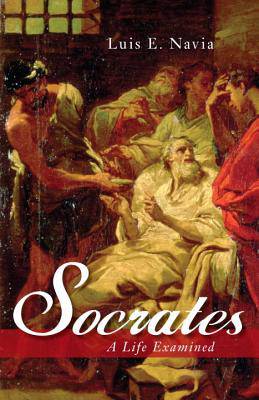
- Afhalen na 1 uur in een winkel met voorraad
- Gratis thuislevering in België vanaf € 30
- Ruim aanbod met 7 miljoen producten
- Afhalen na 1 uur in een winkel met voorraad
- Gratis thuislevering in België vanaf € 30
- Ruim aanbod met 7 miljoen producten
Zoeken
Omschrijving
One of the most influential thinkers in the history of the West was Socrates of Athens (469-399 BCE). Literally, thousands of books and other works of art have been devoted to him, yet his character and the tenets of his philosophy remain elusive. Even his contemporaries had very different impressions of him, and since he himself left no writings to posterity, we can only wonder: Who was this man really? What ideas and ideals can be truthfully associated with him? What is the basis for the extraordinary influence he has exerted throughout history?Philosopher Luis E. Navia presents a compelling portrayal of Socrates in this very readable and well-researched book, which is both a biography of the man and an exploration of his ideas. Through a critical and documented study of the major ancient sources about Socrates -- in the writings of Aristophanes, Xenophon, Plato, and Aristotle -- Navia reconstructs a surprisingly consistent portrait of this enigmatic philosopher. He links Socrates' conviction that the unexamined life is not worth living with Immanuel Kant's later concept of an innate moral imperative as the only meaningful purpose of human existence. He highlights Socrates' unrelenting search for the essence and value of the soul as that aspect of his philosophical journey that animated and structured all his activities. Navia also considers Socrates' relationship with the Sophists, his stance vis-à-vis the religious beliefs and practices of his time, his view of the relationship between legality and morality, and the function of language in human life. Finally, he eloquently captures the Socratic legacy, which, more than twenty-four centuries after his death, is still so urgently relevant today. Navia brings to life this perennially important philosopher, illuminating the relevance of his ideas for our modern world.
Specificaties
Betrokkenen
- Auteur(s):
- Uitgeverij:
Inhoud
- Aantal bladzijden:
- 291
- Taal:
- Engels
Eigenschappen
- Productcode (EAN):
- 9781591025016
- Verschijningsdatum:
- 6/03/2007
- Uitvoering:
- Hardcover
- Formaat:
- Genaaid
- Afmetingen:
- 162 mm x 232 mm
- Gewicht:
- 526 g

Alleen bij Standaard Boekhandel
+ 80 punten op je klantenkaart van Standaard Boekhandel
Beoordelingen
We publiceren alleen reviews die voldoen aan de voorwaarden voor reviews. Bekijk onze voorwaarden voor reviews.











